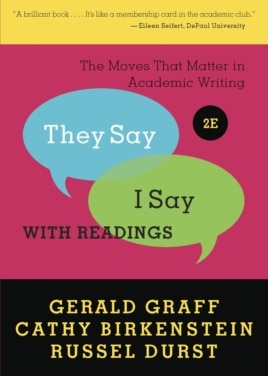16 January, 2015
For VOA Learning English, this is the Education Report.
Gerald Graff and Cathy Birkenstein are the writers of a best-selling book about college writing. The book is called They Say, I Say: The Moves That Matter in Academic Writing. The book has had a major effect on the way writing is taught in the United States. It is a required book at more than 1,000 universities. The goal of this short book is to take the mystery out of academic writing. Gerald Graff says students sometimes make writing harder than it needs to be.
"Somebody needs to explain to students that, difficult as it might be, it's not as hard as you're making it."

"They Say, I Say" second edition cover
English learners often think that academic writing is all about spelling, grammar, and organization. Author Cathy Birkenstein says almost anyone can put a sentence together. The difficult part is learning to read and think critically.

Cathy Birkenstein and Gerald Graff teach English courses at the University of Illinois at Chicago
"These concerns of English language learners aren't always that different from advanced language learners...These are basic questions, really not just of how to write...but they're really how to think academically, and how to structure an argument, and how to really be interesting."
The two experts say that good academic writing follows a simple design called "They Say, I Say." A paper should begin with what others have already said about the subject, or "they say." Then, student writers present their own opinions, or "I say." A college paper should show the writer entering a debate among experts.
"A lot of people think writing can't be reduced to a formula. Well in fact it can...All effective academic writing at least comes down to the basic formula of "they say, I say"...Although most people argue [blank], I argue [blank]."
Mr. Graff agrees.
"Most published journalism and scholarship follows this basic form."
Cathy Birkenstein says the form is common in other kinds of writing as well.
"I think whether you're writing on Facebook and whether you're sending an email, whether you're writing a poem or a novel, and whether you're speaking Vietnamese or French or English, you really have to kind of play this underlying ‘they say, I say' game of responding to what other people are saying and giving them a sense of what you think in response to what they're saying. And if you don't do that, and use some form a template that Gerry and I suggest, or your own version of it, I don't people are going to really understand what you're saying or care about what you're saying."
Good academic writing starts with reading. Gerald Graff and Cathy Birkenstein have some suggestions for getting started.
"Start with what others are saying and play off that. Resist the temptation to give your own opinion until you've sketched out the conversation, the dialog that's going on."
Ms. Birkenstein says students should explain an expert's idea first.
"I think if you're not sure what to write about, summarize a good author, find out who that author is responding to, and figure out the debate or conflict there and figure out where you stand too."
An expanded third edition of "They Say I Say" will be released on February first.
I'm Adam Brock.
To see some examples of academic writing forms from these experts, visit our blog, Confessions of an English Learner.
Adam Brock wrote this story for Learning English. Caty Weaver was the editor.
______________________________________________________________
Words in This Story
formula – n. a plan or method for doing, making, or achieving something
journalism – n. the activity or job of collecting, writing, and editing news stories for newspapers, magazines, television, or radio
scholarship – n. serious formal study or research of a subject
template – n. something that is used as an example of how to do, make, or achieve something
temptation – n. a strong urge or desire to have or do something
sketched out – v. to describe (something) briefly
dialog – n. a conversation between two or more people
edition – n. a particular version of a book
Now it's your turn. What tips do you have for academic writing? Have you tried the "they say, I say" format?